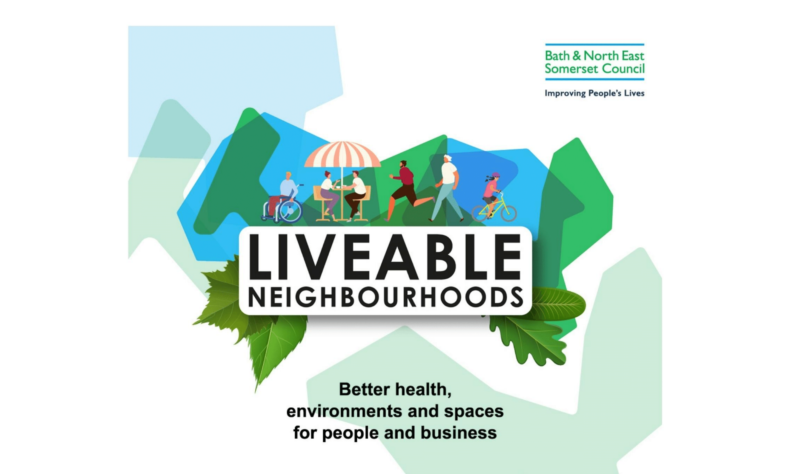Bath & North East Somerset Council is starting the next stage of its Liveable Neighbourhoods Programme, working collaboratively with communities from 15 priority areas.
Over the next three months the council will host a series of in-person workshops with communities giving people who live, work or regularly visit the areas the time to discuss how their neighbourhood streets can be improved.
The Liveable Neighbourhoods Programme aim is to reduce the dominance of vehicles within neighbourhood streets, while maintaining access to homes and businesses, and without disadvantaging those with mobility issues, to create healthier outdoor spaces for everyone to share.
The workshops are expected to result in a package of measures bespoke to each area and which may include measures such as improvements to the public realm, traffic calming, better walking and cycling infrastructure, secure cycle storage, or modal filters that restrict access to certain vehicles. These interventions can reduce issues like through-traffic, speeding, commuter parking and air pollution.
The workshops are part of ongoing consultation with residents, businesses and community groups to develop and deliver Liveable Neighbourhood schemes.
Between last November and January more than 1,600 people responded to a series of questions about Liveable Neighbourhoods with 51% supporting Liveable Neighbourhoods schemes, 36% expressing neutral views, and 13% against their implementation.
The engagement found many areas expressing a wish for changes to improve pedestrian safety, more traffic calming measures, and improved cycling infrastructure. Additionally, a desire for general improvement of the public realm was expressed.
Several concerns were also raised. These included the potential impact of vehicle access restrictions, which some residents were concerned might simply move an existing problem from one area to another.
Councillor Sarah Warren, deputy leader and cabinet member for Climate and Sustainable Travel, said:

We are moving to the next stage of our Liveable Neighbourhoods Programme which is working with communities in the 15 priority areas to co-design interventions in response to the specific issues raised by residents in our earlier engagement.
The aim is to develop bespoke solutions for each area with lots of input from people who live in, work in or regularly visit the areas, so that together we create safer, healthier spaces with fair access to the road space for all.
We have set out our Journey to Net Zero ambitions, to shift the way people get around, reduce emissions, improve air quality, improve public health, tackle congestion and reduce the impact of travel on the climate and the Liveable Neighbourhoods Programme will play a part in achieving this.
Following on from the workshops, the project team will draw on the outcomes to prepare preliminary designs for each of the 15 areas. There will then be a further round of public engagement, allowing everyone tocomment on the proposed interventions for each area.
If the plans are supported, some temporary interventions may be introduced under experimental Traffic Regulation Orders (ETROs), giving residents and businesses a chance to comment or object on how the interventions work in-situ before being made permanent.
Within the 15 areas, there are also five locations where temporary interventions have already been brought forward by ward members to progress more quickly:
- Queen Charlton Lane, Whitchurch (Publow with Whitchurch and Saltford)
- Southlands (Weston, Bath)
- Church Street (Widcombe and Lyncombe, Bath)
- Royal Victoria Park, Bath (Kingsmead and Lansdown, Bath)
- Cork Street and Tennyson Road (Kingsmead and Lansdown, Bath)
The project team are currently preparing the preliminary designs for these pilot interventions, which will then be subject to public engagement. If the plans for the pilot interventions are supported, they will be temporarily introduced on the street with an experimental Traffic Regulation Order (ETRO).
As part of the Liveable Neighbourhoods Programme, ward members also brought forward proposals for seven residents parking zones. These are now being consulted on from 5 May to 2 June (5pm)
Residents and businesses who expressed a desire to be kept involved in the process during the previous round of engagement are being contacted to take part in this next phase of the Liveable Neighbourhoods Programme. The council is also working hard to ensure representation from harder to reach groups, people with disabilities, and under-represented groups.
Anyone who lives in, works in or regularly visits one of the 15 priority areas and who missed the initial opportunity to get involved; who feels they can input to the co-design workshop; or who represents a specific interest/demographic, can express their interest in attending the workshops by emailing liveableneighbourhoods@bathnes.gov.uk
